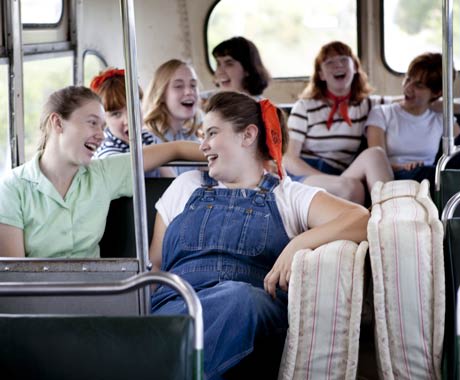Seeking empowerment, a victim half-blinded by hate will justify emulating the debasing acts of her or his oppressor. The pronoun is unquestionably "her" in Laurent Cantet's reverent adaptation of Joyce Carol Oates's novel of a group of teenage girls in the '50s who rebel against vile patriarchal exploitation and domination.
Not a single sexually potent male substantially appears in this narrative that isn't depicted as some form of disgusting predator or authoritarian bigot. Only a hoary, park-dwelling vagrant imparting socialist ideals to firebrand gang leader "Legs" (forceful newcomer Raven Adamson) is depicted as any sort of respectable male figure.
Interestingly, Cantet demonstrates a great deal more objectivity and respect for the story's morally damning themes than Annette Haywood-Carter's glib and sexualized mid-'90's version, with Angelina Jolie playing Legs as a vampy anarchist slacker galvanizing a bunch of disaffected, middle-class slackers.
As the group evolves from the supportive friendship of Legs and eventual confessor Maddy (Katie Coseni) to a surrogate family for working class girls from domestically unstable homes, the gang's principles begin an entropic unfurling from exacting justice for unsung crimes to ennobling vengeance for irresponsible, self-indulgent gain.
Cantet eschews any frilly filmmaking techniques in favour of presenting events in a clear and frank manner. He dispassionately docusments the girls marking a teacher as a child molester and laying a well-deserved beating on Maddy's perverted, unscrupulous uncle as he does their conning and robbing of pathetic, reprehensible, weak-willed, but ultimately harmless men.
At nearly two-and-a-half hours, Confessions of a Girl Gang is faithful to a fault in its straightforward translation of the source material, retaining repetitive actions and conversations that, while indicative of the film's honest presentation of group dynamics, do little in a cinematic context other than overstate themes already made abundantly clear.
(eOne)Not a single sexually potent male substantially appears in this narrative that isn't depicted as some form of disgusting predator or authoritarian bigot. Only a hoary, park-dwelling vagrant imparting socialist ideals to firebrand gang leader "Legs" (forceful newcomer Raven Adamson) is depicted as any sort of respectable male figure.
Interestingly, Cantet demonstrates a great deal more objectivity and respect for the story's morally damning themes than Annette Haywood-Carter's glib and sexualized mid-'90's version, with Angelina Jolie playing Legs as a vampy anarchist slacker galvanizing a bunch of disaffected, middle-class slackers.
As the group evolves from the supportive friendship of Legs and eventual confessor Maddy (Katie Coseni) to a surrogate family for working class girls from domestically unstable homes, the gang's principles begin an entropic unfurling from exacting justice for unsung crimes to ennobling vengeance for irresponsible, self-indulgent gain.
Cantet eschews any frilly filmmaking techniques in favour of presenting events in a clear and frank manner. He dispassionately docusments the girls marking a teacher as a child molester and laying a well-deserved beating on Maddy's perverted, unscrupulous uncle as he does their conning and robbing of pathetic, reprehensible, weak-willed, but ultimately harmless men.
At nearly two-and-a-half hours, Confessions of a Girl Gang is faithful to a fault in its straightforward translation of the source material, retaining repetitive actions and conversations that, while indicative of the film's honest presentation of group dynamics, do little in a cinematic context other than overstate themes already made abundantly clear.
